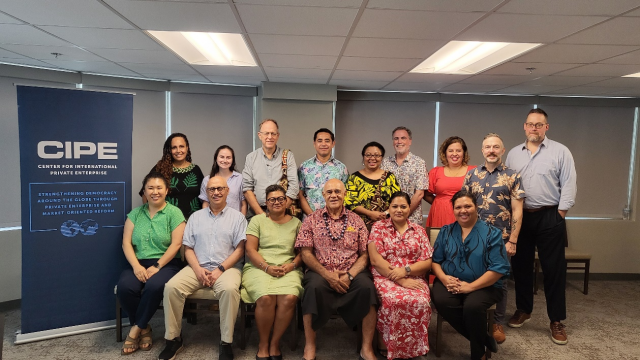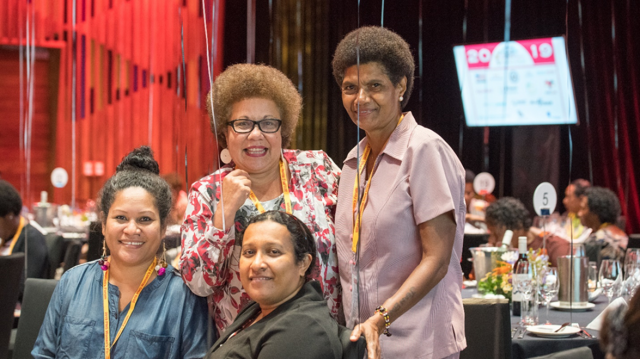CIPE is expanding its work with partners in the Pacific Island Countries to include pilot programs in Fiji, Bougainville, and Kiribati. This is in addition to broader initiatives in Melanesia, Polynesia, and Micronesia. All are aimed at supporting inclusive economic growth and security, as well as democratic resilience. Among the focuses: addressing digital economy challenges, advancing women’s economic empowerment, assessing the true impact of Belt and Road Initiative deals, and mitigating corrosive capital situations This work builds on lessons learned from other impactful CIPE programs in the region over the last ten years. CIPE’s Inuk Kim walks us through important milestones.
A Roadmap for Increasing Economic Opportunity
-

CIPE gathered nine partners from across the Pacific in Honolulu, Hawaii for the Pacific Strategy Workshop held in spring 2024.
Establishing Papa New Guinea’s Women’s Chamber of Commerce and Industry in 2014 created a new platform to provide women with valuable networking and collaboration opportunities. CIPE worked closely with PNGWCCI members to develop strategies that help women entrepreneurs grow their businesses and connect with essential resources. This included providing women with medium and long-term action plans to influence public policy and meet with experienced members from other national chambers of commerce.
PNGWCCI’s growth marked a significant step forward for women’s economic empowerment in PNG. In 2016, CIPE identified another pathway to support women entrepreneurs by establishing the PNG Women’s Business Resource Center (WBRC) and appointing a local program coordinator.
Additionally, CIPE partnered with PNG’s Pacific Adventist University (PAU) and IBSUniversity (IBSU) to add entrepreneurship courses to business programs and improve faculty training. Expanding academic support for the next generation of business leaders has served as another meaningful way to strengthen PNG’s entrepreneurial ecosystem.
Bringing Together Stakeholders
Outside of academia, CIPE has engaged with various private sector and government stakeholders, leveraging their expertise. For example, CIPE achieved a significant milestone in 2016 when leading global business chamber expert Hammad Siddiqui provided a session for women entrepreneurs at the U.S. Embassy Port Moresby’s American Corner. This event educated participants on how to use effective networking to support small businesses with limited resources. As a result, many participants reported new interest in creating and growing businesses.
Additionally, CIPE celebrated the Women Business Resource Center’s first anniversary with an event that attracted the enthusiasm and support of notable guests. Attendees included Nicola Ross, Counsellor for Gender and Sport, on behalf of the Australian High Commissioner to PNG, and U.S. Ambassador to PNG Catherine Ebert-Gray. Following the event, CIPE released its Business and Professional Women white paper, offering further guidance to women seeking to establish themselves in the private sector.
Throughout CIPE’s work within PNG’s entrepreneurial ecosystem, it has formalized several partnerships through Memorandums of Understanding (MOUs). For example, CIPE is proud of its partnership with the National Development Bank Investment’s Young Entrepreneurs Scheme, which provided youth interested in starting a business with training in financial literacy and business plan development.
Another key CIPE achievement in the broader region was the creation of an American Chamber of Commerce for the South Pacific, as part of a USAID program. The AmCham Coral Sea serves as a unique platform for promoting inclusive economic growth, foreign investment, and greater opportunities in PNG, Solomon Islands, and Vanuatu.
Expansion and Program Recalibration

As its programming in PNG has expanded, CIPE has worked to connect areas that traditionally do not receive as many resources as the capital city to create a stronger entrepreneurial ecosystem. In 2019, CIPE co-hosted the fifth PNG Women’s Forum in partnership with the U.S. Embassy in Port Moresby. Representatives from 22 regions attended, including the Autonomous Region of Bougainville, which is seeking independence from PNG by 2027, and the Highlands region, home to a vast array of natural resources and a burgeoning agricultural industry.
In 2020, the COVID-19 pandemic posed a significant challenge to the Resource Center in PNG. CIPE acted quickly by pausing in-person operations before the government mandated closings and using this period to learn how the pandemic was impacting the business environment. As a result, the WBRC was able to publish COVID-19 impact assessment reports, develop response programs, and a pivot to telephone and virtual support for WBRC users. During an unstable time, CIPE maintained its stable commitment to adaptive and effective PNG programming.
When the Resource Center opened again in 2022, it saw a quicker return of participants than expected. Over 15 workshops were held within the first three months and attracted 170 attendees. This quick return of activities reaffirmed the importance of the WBRC in supporting business recovery efforts. Post-training surveys showed that 94 percent of felt the knowledge gained would help their businesses.
Additionally, CIPE conducted gender workshops for 26 university staff members and offered “Know Your Rights” training that offered sign language interpretation for the first time. Through these workshops, CIPE has been able to encourage partner universities to be leading ambassadors of change for gender equality and expand entrepreneurship education opportunities for people with disabilities.
CIPE’s Success
CIPE’s successes have solidified its presence in PNG and shown its unique contribution to strengthening the country’s economic ecosystem. CIPE plans to enhance resources, develop new partnerships, and further build capacity in existing partner universities. Encouraged by Port Moresby’s success, CIPE aims to replicate this model in other PNG regions, Pacific Island countries, and beyond.
Published Date: November 15, 2024
